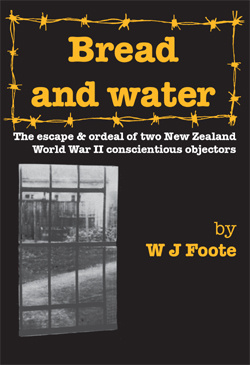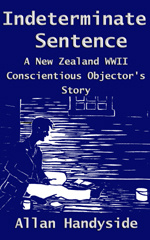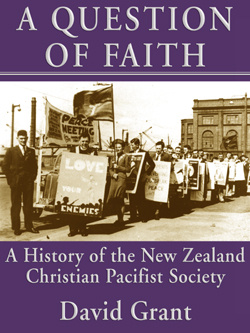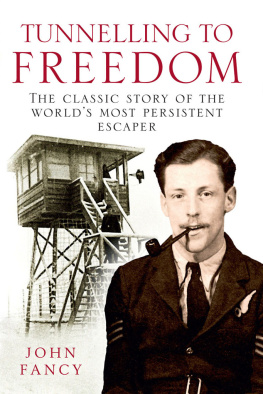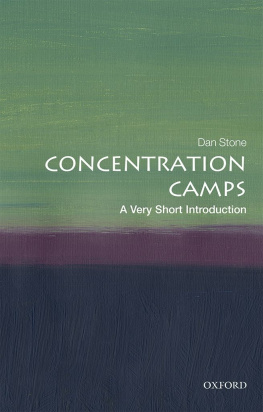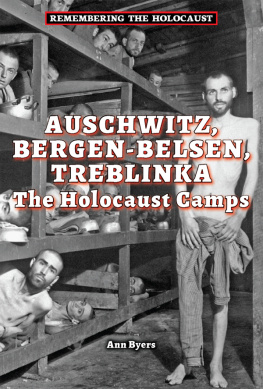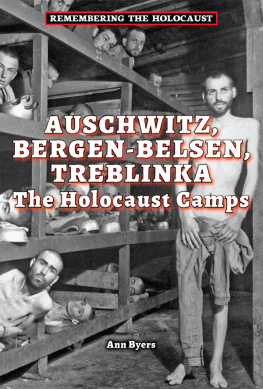Bread and water
The escape & ordeal of two
New Zealand World War II conscientious objectors
by W J Foote
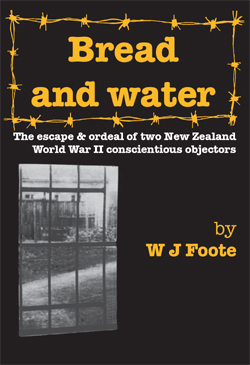
Happy are those that work for peace;
They shall be called the children of God.
Copyright 2013 W J Foote
Smashwords edition
First published in print format 2000
by Philip Garside Publishing Ltd.
All rights reserved. This book or any portion thereof may not be reproduced or used in any manner whatsoever without the express written permission of the publisher except for the use of brief quotations in a book review.
This ebook is licensed for your personal enjoyment only. This ebook may not be re-sold or given away to other people. If you would like to share this book with another person, please purchase an additional copy for each recipient. If you are reading this book and did not purchase it, or it was not purchased for your use only, then please purchase your own copy. Thank you for respecting the hard work of this author.
* * * * * *
Acknowledgements for 2000 print edition
Chapters 1 to 13 of this book were written in association with Chris Palmer and Merv Browne through interviews, correspondence, and from their own writings.
Two main sources were Out In The Cold by David Grant and Till Human Voices Wake Us by Ian Hamilton.
Others whose assistance is acknowledged are Jean Palmer, Marj Browne, Anne Foote, Lynn Rain, Jack Rogers, Brian Turner, Roger Steele, Anna Applin and Arthur Olsson.
Photographs were contributed by Chris Palmer, Merv Browne, Will Foote, David Grant, Jack Rogers and Arthur Olsson. As noted in their captions, some photographs were obtained from the Alexander Turnbull Library, National Library of New Zealand, Te Puna Matauranga o Aotearoa.
The original typescript was produced by Susan Barnes.
The cover photograph was taken by Theo Nightingall from inside a Red Compound hut at Hautu detention camp.
Published with the assistance of the Willi Fels Memorial Trust
* * * * * * * *
ISBN 978-1-927260-06-7

Philip Garside Publishing Ltd
PO Box 17160
Wellington 6147
New Zealand
books@pgpl.co.nz
www.pgpl.co.nz
Table of Contents
About this book
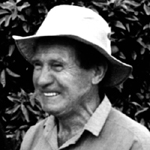
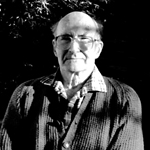
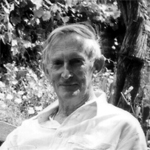
Merv Brown, Chris Palmer and Will Foote c.1999
New Zealand World War II conscientious objectors were treated more harshly by the authorities than those in other countries.
Imprisoned for their pacifist beliefs, first in Mt Eden and Wanganui, Chris Palmer and Merv Browne were then moved to military defaulters camps in the central North Island.
It appeared to them that the camps were designed to hold dissidents permanently and put them beyond the law. To bring conditions in the camps to public notice, in 1944 Chris and Merv escaped to Wellington. There they printed and distributed a pamphlet and tried to lobby politicians.
This book tells of their audacious adventure and consequent punishment.
It explores how the mens Christian faith, developed through membership of the Methodist church, led to their anti-war stance and how it sustained them during their ordeal in solitary confinement. The book also touches on their involvement with the Riverside Community after the war.
Author Will Foote has written several books on peace topics. He was also imprisoned in a detention camp during World War II.
Foreword

The heroes of war are publicly honoured, and their brave deeds are taught to children of the following generations. The heroes of peace most often go unrecognised, and their courage is little known outside their family circles; indeed, that courage is made to appear as cowardice. Those few stories which get recorded in print are therefore precious. In both world wars in which New Zealand was involved, those who rejected the call to take up arms were harshly treated, and not only by the state.
This is a hero story. It is also an escape story which reveals as escape stories often do the readiness of outsiders to help, whether or not they understood the motivation of those they were helping. Many of our freedoms are put into cold storage in wartime and there are no opportunities for public discussion of dissident viewpoints. But it is those who are prepared to stick their necks out who keep our civil liberties alive, and ensure that they are recovered when there is no longer an enemy to profit from indiscretions.
This story tells us why Christian pacifists mustered the courage to face prison and detention camps rather than take up arms against their fellow men. There were other detainees with different viewpoints. All had the courage and endurance to stand apart from the current popular enthusiasm for the war effort, and to take the consequences. The bibliography at the end of this book suggests sources to explore further; and where we may learn of other heroes.
Elsie Locke, May 2000
Preface

About six months ago I was present at a meeting when Chris Palmer was persuaded to talk about his part in the story told in this book. Listening to his dry anybody-could-have-done-it tone, it suddenly struck me that here was a story worthy of a wider audience. Some of the story I knew soon after it happened in 1944, through a fairly efficient underground news service. Some had already been told in various publications. I felt it needed to be put in a wider context. What family background and other external influences led to Chris and his companion Merv Browne acting as they did? What sort of lives did they lead after their traumatic experiences?
Chris and Merv were two of an outstanding group of young men led by their Christian faith to oppose the government of the day. As I do not entirely share that faith, I hope I have made their motivation clear. Although they were at the time despised and rejected, even by many in their own Church, they were men of whom we should be proud. Although much of the story happened in war time, these were men of peace. This story is a reminder that even in the greatest conflagration of modern times there were those who felt that there was a better way.
In the annals of New Zealand escapology, the escape described in the first chapter was not spectacular. But what happened just before their return to captivity is, as far as I know, unique. The sheer effrontery, the courage of what Chris and Merv did, still amazes me.
How we treat our outcasts is a measure of our civilisation. Judging by the treatment given to Chris, Merv, and others of like mind in our penal institutions, we dont rate very highly. Another New Zealand writer, Michael King, has said, We need our own epics. This story is one of them.

